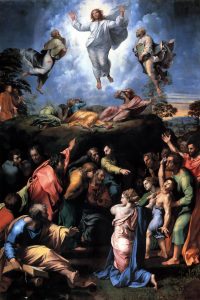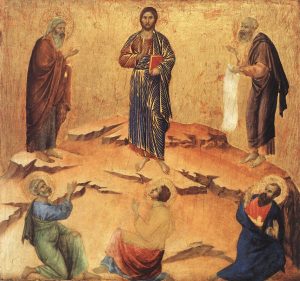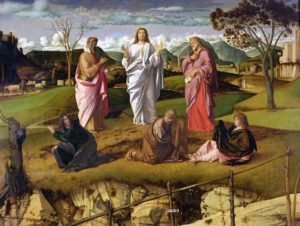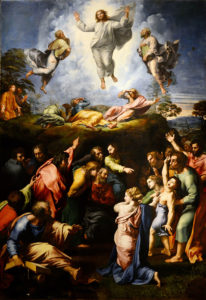Illuminations on the Lectionary readings for Feb. 15, 2026 (Last Epiphany A/Transfiguration)

The Transfiguration (1516-20), oil painting on panel by Raffaello Sanzio da Urbino, known as Raphael (1483-1520). Pinacoteca Vaticana, Vatican City. (Click image to enlarge.)
First Reading: Exodus 24:12-18
Significant things in Scripture sometimes happen on mountain tops, where Earth and heaven come close. On Transfiguration Sunday, concluding the Epiphany season, we come to the mountaintop. As we turn from the incarnate light of Epiphany toward the penitential pathway of Lent, our readings show us the awe and fear of humans encountering the divine. In the first reading, we see Moses going up Mount Sinai to receive the Ten Commandments from a mighty God cloaked in clouds and fire.
Psalm: Psalm 2
Psalm 2, a Messianic hymn of praise, envisions God as a mighty king, the King of Kings to whom earthly kings must submit with fear and trembling. Those who seek to break away from God’s power and that of God’s anointed, the Messiah, will earn only divine derision and terrifying rage, the Psalmist sings. Such actions have consequences. But when God’s anointed is set on the holy hill of Zion, the temple, the psalm concludes, happy are all who take refuge in God.
Alternate Psalm: : Psalm 99
Psalm 99, a hymn of praise offered as an alternate reading to Psalm 2 this week, also envisions God as a mighty king, at whose appearance the people tremble and the earth shakes. Yet, recalling that Moses and Aaron received God’s law and teaching, the Psalmist also shows us a forgiving and kind God, a doer of justice, equity, and righteousness.
Second Reading: 2 Peter 1:16-21
Most modern Bible scholars agree that this letter, perhaps the last written in the New Testament, is not the work of Simon Peter, the apostle. It was almost certainly written in Peter’s name by a leader in the early church a century or more after the Crucifixion. Still, it opens a window into the thinking of the second-century church, when believers were trying to understand why Jesus had not returned as soon as had been expected. Everything they have heard about Jesus is true, the letter reassures them, speaking as if in Peter’s own voice: Peter himself was present at the Transfiguration. Trust in God and wait for the dawn and the morning star.
Gospel: Matthew 17:1-9
Using images that recall Moses receiving the commandments on the mountaintop, with words that echo God’s approving words at Jesus’s baptism in the Jordan, Matthew’s account shows Jesus with the ancient prophets Moses and Elijah. Jesus is transfigured, glowing in dazzling light, revealed as both human and divine. It’s no wonder that Peter, James, and John were terrified to hear the voice of God! but Jesus reassures them with a loving touch. Then, for the first time in the Gospel according to Matthew, Jesus speaks of his coming resurrection.



